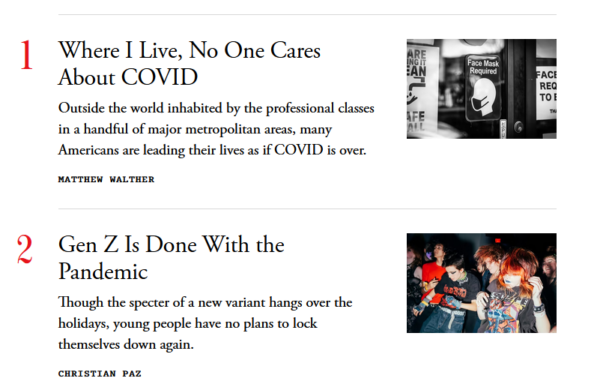“The Atlantic” Now Railing Against Current Pandemic Policies

I noted that The New York Times as adopting my science-based approach to dealing with the COVID-19 pandemic, rather that the fear-mongering that has been favored since news of the outbreaks of the respiratory virus in China broke in early 2020.
I find it fascinating that another clearly liberal publication is also veering to a more sensible approach as well. Here are two recent top stories in The Atlantic:

The first piece is from author Matthew Walther.
I am old enough to remember the good old days when holiday-advice pieces were all variations on “How to Talk to Your Tea Party Uncle About Obamacare.” As Christmas approaches, we can look forward to more of this sort of thing, with the meta-ethical speculation advanced to an impossibly baroque stage of development….I don’t know how to put this in a way that will not make me sound flippant: No one cares. Literally speaking, I know that isn’t true, because if it were, the articles wouldn’t be commissioned. But outside the world inhabited by the professional and managerial classes in a handful of major metropolitan areas, many, if not most, Americans are leading their lives as if COVID is over, and they have been for a long while.
The second piece is by Christian Paz, an assistant editor at The Atlantic.
…It’s still too early to determine just how disruptive the Omicron phase of the pandemic will be for most Americans. The Delta variant turned out to be much more transmissible than the original strain and stunted summer celebrations with breakthrough cases and surges in unvaccinated communities, but many of the young people I spoke with for this story told me they aren’t as worried now.Part of that response comes from pandemic fatigue, but much of this feeling is a result of the new risk calculus they have developed for how they want to live their lives. As a member of this generation, I can confirm as much from what I’ve observed among friends.
And while I would like to believe my persuasive posts have lead people to reassess COVID risks, I suspect the underlying cause of the newfound restraint are polls like this:
When Americans were asked by pollsters which political party they preferred to control Congress, they selected Republicans over Democrats by a double-digit margin. CNBC called the GOP lead in the polling “historic.”While only about a third [34 percent] of respondents said they prefer Democrats to control the legislative branch of government, 44 percent said they prefer Republicans. That’s a 10-point lead for the GOP less than a year before the 2022 midterms will be held.
It appears the margins of discontent with the Democrats cannot be overcome by ballot-harvesting using pandemic-based election rules. Clearly, there is a political aspect to infection risk calculation that has never existed in the history of disease.
CLICK HERE FOR FULL VERSION OF THIS STORY